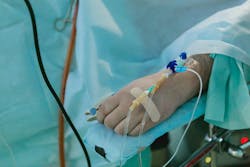Drug that calms cytokine storm associated with lower mortality risk among COVID-19 patients on ventilators
Critically ill COVID-19 patients who received a single dose of a drug that calms an overreacting immune system were 45 percent less likely to die overall, and more likely to be out of the hospital or off a ventilator one month after treatment, compared with those who didn’t receive the drug, according to a new study by a team from the University of Michigan.
The lower risk of death in patients who received intravenous tocilizumab happened despite the fact that they also had twice the risk of developing an additional infection, on top of the novel coronavirus. The study is published in Clinical Infectious Diseases after being available as a preprint last month.
It suggests a benefit from timely and targeted efforts to calm the “cytokine storm” caused by the immune system’s overreaction to the coronavirus. Tocilizumab, originally designed for rheumatoid arthritis (RA), has already been used to calm such storms in patients receiving advanced immunotherapy treatment for cancer.
The researchers base their conclusions on a thorough look back at data from 154 critically ill patients treated at Michigan Medicine, U-M’s academic medical center, during the first six weeks of the pandemic’s arrival in Michigan from early March to late April. The analysis looked at patients’ records through late May.
During that time, when little was known about what would help COVID-19 patients on ventilators, about half of the studied patients received tocilizumab and half did not. Most received it within the 24-hour period surrounding their intubation. This created a natural opportunity for comparing the two groups’ outcomes in an observational study, though clinical trials are still needed to truly see if the drug provides a benefit, the authors say.

